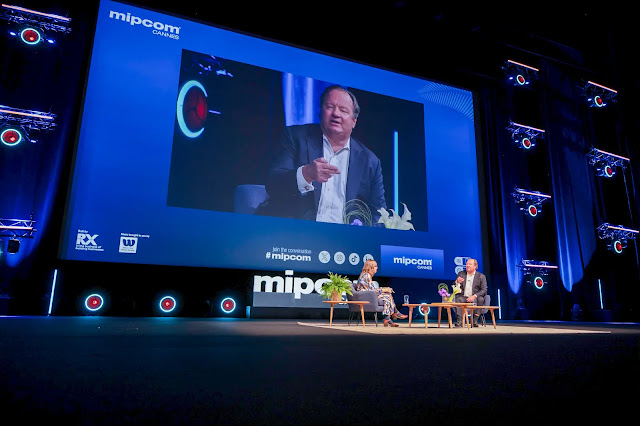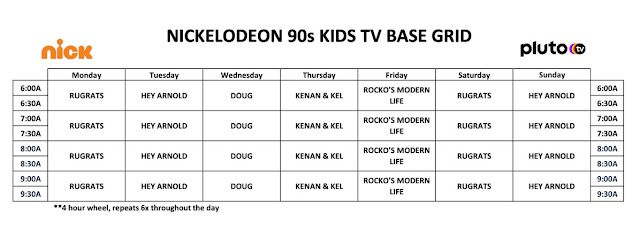Studio chief shares optimism that SAG-AFTRA contract talks will resume: 'We'll get there'
 |
| PERSONALITY OF THE YEAR BOB BAKISH Paramount Global Cynthia Littleton Mipcom Oct. 17, 2023 | © Y. COATSALIOU / 360 MEDIA |
CANNES – Paramount Global CEO Bob Bakish delivered a testimonial to the power of “new age” local and regional content licensing partnerships during a wide-ranging Q&A held Tuesday, October 17 after the Viacom veteran was feted as Mipcom’s Personality of the Year.
During the Q&A that followed the award presentation, Bakish batted down industry speculation about Paramount’s financial health (“To say we were saved by the strikes is totally an overstatement”) and his hope that the SAG-AFTRA strike will soon be in Hollywood’s rear-view mirror (“We’ll get there”).
Paramount Global unveiled a multi-year pact with Greek pay TV service Cosmote TV just before Bakish sat for a Q&A with Variety co-editor in chief Cynthia Littleton. As Bakish detailed, that deal is symbolic of a boomerang in the marketplace. The largest Hollywood studios in recent years sought to hold back the sale of movies and TV shows in key territories outside the U.S. in an effort to stock fledgling streaming platforms with high-wattage exclusive content.
Paramount Global kept its sales pipeline open much more than its larger rivals. This year, as he was feted at the annual conference and market for global content buyers, Bakish was quick to use the freshly signed Cosmote TV pact (which is a small amount of business in the scheme of things for Paramount) as a sign of the company’s commitment to a bespoke approach to international content sales and distribution.
“We think this is an important development in the arc of the content licensing business,” Bakish said. “This is the first of many markets that we want to unlock this way. The first of many more to come.”
Much of the conversation revolved around how Paramount is adjusting to the economic transition from linear cable to operating its own subscription streaming and free ad-supported platforms, with Paramount+ with Showtime and Pluto TV, respectively. Bakish argued that Wall Street’s (and Variety’s) focus on whether Paramount does better overall with earnings that come in the door from linear or digital platforms was the wrong way to evaluate the future of the company’s profit engines. Whether Paramount cuts a traditional output deal in a market such as Greece or initiates a deeper streaming distribution partnership as it did for Paramount+ with a local streamer in South Korea, the end goal is the same.
“Both are positioning Paramount as essentially a global collection of content to ride on top of a local streaming platform,” he said.
Paramount Global is a core member company of the Alliance of Motion Picture and Television Producers, the bargaining agent for Hollywood’s major studios and streamers. Bakish didn’t offer much about the state of the SAG-AFTRA strike, which hit another speedbump last week when the AMPTP surprised the union by suspending talks after five bargaining sessions. The actors work stoppage passed the three-month mark on Oct. 14. Nonetheless, Bakish offered some optimism about reaching a resolution.
“Yes, things broke down a bit last week, but they want to get back to the table. And we’ll get there because ultimately we all want to get back to work,” he said. “We were talking to licensing partners all day on CBS shows like ‘Elsbeth’ and ‘Matlock’ whose delivery is affected by the strike. We very much want to deliver those shows to the world’s consumers and to our partners. We want people to get back to work. And I’m optimistic we’ll get there as an industry in the near term.”
Paramount is in the midst of what Bakish called “peak investment” year for the Paramount+ streamer. The company’s performance today remains in line with earlier projections that the parent company will return to earnings growth in 2024, after 2023 is dragged down by hundreds of millions of dollars in streaming losses. That has led to speculation in the industry that the 148-day WGA strike and ongoing SAG-AFTRA strikes had a big silver lining for Paramount Global because it paused the studio’s obligation to shell out payments to writers, directors, actors and some producers. The short-term strike savings are a welcome factor for every studio, Bakish observed, but he bristled at the suggestion that the company would be in dire straits from a cash flow perspective if not for the work stoppage.
“I’ve said publicly that the strike is accretive to our cash in 2023. That is true and it’s true for the industry writ large. But to say we were saved by the strike is totally an overstatement,” Bakish said. “We’re playing the hand we were dealt. We didn’t want to be in a strike.”
He acknowledged that the AMPTP made the last move to suspend talks on Oct. 11, catching the union by surprise after five bargaining sessions were held earlier this month.
“We would very much like this strike to be over so everyone get back to work,” Bakish said. “The notion that it saved the company is wildly overstated.”
Bob Bakish Talks Content Distribution Evolution
Bob Bakish, president and CEO of Paramount, shared his thoughts on the evolution of the content-distribution business and its continued importance to the company in his Media Mastermind keynote at MIPCOM, where he was honored with the Personality of the Year award.
Bakish last delivered a keynote at MIPCOM in 2011, when he was at the helm of Viacom International Media Networks. “Today’s environment requires that we’re hardwired and ready for change—call it evolution, call it revolution. To us, it’s about constantly reinventing or risking irrelevancy. That was true then, and it’s certainly true now.”
Bakish continued, “Change brings new challenges. But also brings new opportunities, including, importantly, in content licensing, a business that has significant strategic and financial value for Paramount. A business we have always been committed to. And while our peers were pulling back content and putting up walled gardens, we never left. All of us in Cannes today share in some shape or form a commitment to the content licensing ecosystem. One that supplies a robust supply of content from diverse sources to entertain the world’s consumers and one that provides an opportunity for new creators to break through and untold thousands to be able to earn a living. Importantly, we share not only a commitment but a responsibility to move the industry forward, to evolve it, to grow it for our mutual benefit. Content licensing was, is and will continue to be a fundamental part of our economic model. It is an incremental platform for the development of our global franchises, which helps get our content in front of as many consumers as possible. It’s a profitable multibillion-dollar business for Paramount, and it’s a critical driver of our broader strategy to make and distribute content with mass global appeal across all genres from brands that matter, maximize this content across multiple platforms and multiple revenue streams and to do it all more efficiently than ever before, all in the pursuit of long-term value.”
Bakish went on to discuss Paramount Global Content Distribution’s expanded multiyear licensing deal with Cosmote TV in Greece, creating a Paramount+ branded area on its platform. “We look at the intersection of consumers, customers and Paramount,” Bakish said. “We do that with a strong underpinning of content and ultimately a quest for value and growth.”
The deal with Cosmote TV reflects a new age in content licensing, he said. “We provide a world-class collection of content. In a world of lots of entertainment options, there is unquestionable sustained demand for that kind of content. We have been scaling our streaming business. We saw a real partnership opportunity to go and provide a customer with what they were looking for, which is high-quality content—think output deal—but in this case in what I call a Paramount+ envelope that they ingest into their platform. We’re not launching Paramount+ the app on an O&O basis in that market. Instead, we’re providing that content and reaching those streaming consumers through a partner.”
The move helps Cosmote TV with engagement and churn, and “is a far more attractive financial expression for us than launching in the market. We think this is a very important development in the arc of the content-licensing business. It is very strategic on our part and very thought through. And candidly, it’s the first of many markets we’re going to unlock this way.”
On the streaming business in general, “2024 will be a year of significant earnings growth for the company, driven by a significant reduction in streaming losses.”
Expanding into multiple markets with a D2C model was the model of choice for many operators two years ago; today, you need a more multifaceted approach to streaming, he said, notably by way of partnerships. He called it a “more fiscally responsible and hopefully more financially powerful way to unlock the streaming total addressable market.”
Paramount benefits from being in both SVOD with Paramount+—which includes an ad-lite tier—and AVOD with Pluto TV, he noted.
“The trough” the company finds itself in—alongside a raft of other media companies—is deeper than expected because of the conditions in the ad market, he said. “It’s not actually deeper because we’ve done some work on the cost side, and we decided to consolidate Paramount+ and Showtime. But clearly the ad market softening in ’22 into ’23 was an additional headwind that we’re playing through. And fundamentally, we saw this coming. We continue to be focused on execution. We’re doing it in a differentiated way, and we’re going to demonstrate that we are a scale streaming player.”
There is room for growth on the streaming front, with the total addressable market “fundamentally larger” than the traditional linear universe. “Unlocking that TAM in a financially attractive way makes partnership very important. That’s the route we’re on.” Greece is the latest example, but there are others, such as CANAL+ in France, Sky in the U.K. and Delta globally. “All these are value-creating elements of a broader partnership around streaming that differentiates us in the marketplace. And again, is very important to our path forward and the path to profitability.”
Bakish also noted that the linear ecosystem is still a key contributor to Paramount. “One is financial. The other is, we share content with that ecosystem on a windowed basis. We leverage marketing. We fulfill advertising deals. We do distribution deals. It’s financially accretive to the company.”
###
Stream a Mountain of Entertainment, including your Nickelodeon favorites on Paramount+! Try it FREE at ParamountPlus.com!
Originally published: October 18, 2023.


























